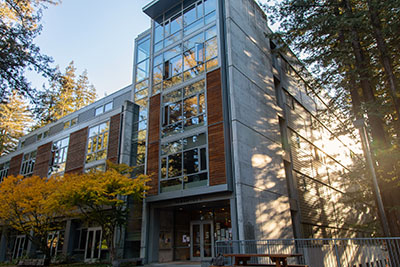- Start where you have resources and available partners. Build networks and momentum as you go.
- Start where you have the least resistance. Keep thinking about what could be next.
- Create a team. Find the people in your network who are interested in a shared vision—those who are willing, have energy, and some opportunity for resources to support the project.
- Understand how separate projects can be connected by a larger vision of change. Be willing to share this vision to explain the importance of each step along the way.
Experiential Learning at the University of California at Santa Cruz

In 2020, Jasmine Alinder joined ACLS Consortium Member University of California at Santa Cruz (UCSC) as Dean of Humanities. As a community-engaged scholar and public historian, she brought with her a commitment to the humanities and student experiential learning. The first step was to get to know the community—a challenge, since it was during Covid—and find out what was already happening in the humanities and on campus. While there were several pockets of innovative activity, there was no single document or website that outlined all experiential learning opportunities. Alinder hired a graduate student, who put together an asset map of existing programs. This provided her with a better understanding of how she could build on what was already there. At the same time, an opportunity to participate in the ACLS Luce Design Workshop for a New Academy enabled her to think about how to approach this work with a small team from her new institution.
Alinder describes experiential learning as a high-impact practice that can help make connections for students. At UCSC’s Humanities Institute, for example, undergraduate and graduate students in the Public Fellows Program work on research, programming, communications, and other activities with non-profit organizations, companies, and cultural institutions. These experiences can provide students with more information about how the skills they have developed in university programs are preparing them for different kinds of work after graduation. Noting that these pathways are particularly important for graduate students, Alinder comments that this approach is not about “workforce preparedness” but rather an effort that can and should be authentic to the humanities. From the beginning, she understood that the larger project of recentering the humanities—making it more attractive for students to take humanities courses, better communicating their value, and changing the profile of humanities research at UC Santa Cruz—would involve working with an array of constituents across campus.
While Alinder had an overarching vision, she was also open to where she began the work of reinvigorating the humanities. A successful grant from the National Endowment for the Humanities (Humanities Initiatives for Hispanic-Serving Institutions) enabled her to build relationships between STEM majors and the humanities with a new curriculum, the Humanizing Technology Certificate Program, designed for engineering students. Partnering with The Humanities Institute and UC Santa Cruz’s Teaching and Learning Center, the Humanities Division brought together faculty and graduate students to plan and devise the certificate courses, which would bring “humanistic methods and thinking to contemporary issues in technology and engineering” and also fulfill General Education requirements.
Humanizing Technology enabled Alinder to collaborate with others interested in the larger vision of recentering the humanities and expanding experiential learning. As Alinder worked on this project, she continued to think about how to use the Public Fellows Program as a foundation for this goal. After two years, she was able to assemble a “student achievement team” of three staff members, including an experiential learning coordinator. Seed funding from a donor enabled them to work on a Mellon Foundation proposal, which would allow them to pay students for internships and research. When they received the grant, they were able to start right away; they already had staffing in place.
Employing Humanities offers paid and for-credit experiential learning opportunities for humanities majors to have hands-on training, including undergraduate research and internships. It connects students with community organizations for service-learning opportunities; supports career paths and programs for humanities majors; and encourages new humanities curricular innovations for all majors. Among other innovations, Employing Humanities will fund a career engagement specialist who only works with humanities students, filling a gap often felt by students who seek out help from traditional career services.
Alinder views Employing Humanities at the center of a larger institutional change project that involves many interconnected parts—for example, expanding what counts as research for faculty tenure and promotion and focusing more effort on General Education courses, where the majority of students encounter the humanities. As of this writing, the program has just finished its first year, and student comments are positive. Alinder is optimistic. When asked about her hopes, she says, “I want humanities majors and minors to feel well supported by their programs, and proud of being in the humanities. I want more visibility and respect for what our students are capable of and what our faculty and staff make possible.”

